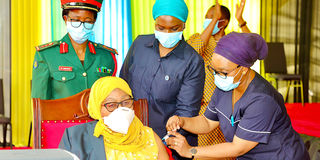Tanzania moves from Covid-19 denier to a response model in Africa

President Samia Suluhu Hassan receives Covid-19 vaccination at State House, Dar es Salaam, on July 30, 2021. PHOTO | FILE
What you need to know:
- The World Health Organisation has declared the country the best performer in the Covid-19 Vaccine Delivery Partnership among 34 African nations whose vaccination rates were below 10 percent by January 2022
Dar es Salaam. Until early 2021, Tanzania was a Covid-19 denier, but two years later, the World Health Organisation (WHO) now ranks the country as the best performer in Africa in increasing Covid-19 vaccination coverage.
According to health experts, it is not surprising for Tanzania to become the best performing country in increasing Covid-19 vaccination coverage given concerted interventions that have been made to speed up people’s resilience against the pandemic.
Tanzania was among African countries with poor coverage of Covid-19 vaccination, with only 2.8 percent of the total population having been vaccinated by mid-January 2022.
However, this had increased exponentially to 49 percent by the end of January 2023, according to the WHO.
The organisation announced on April 20 that Tanzania had emerged as the best performer in the Covid-19 Vaccine Delivery Partnership among 34 African countries that were below 10 percent by January 2022.
Tanzania officially started vaccinating its population on July 28, 2021, being behind many African countries that started to roll out vaccination much earlier.
This followed the government's dramatic U-turn from rejecting vaccines as a “sinister plot against Tanzania” to embracing vaccination, thanks to President Samia Suluhu Hassan’s initiative.
The President led the way by being vaccinated in public in the most decisive signal yet of a break from the policies of her late predecessor, who had repeatedly dismissed the threat of the pandemic.
President Hassan took office after the death on March 17, 2021 of Dr John Magufuli, who had warned Tanzanians against accepting Covid-19 vaccines and instead recommended the use of traditional remedies such as steam inhalation.
Achieving vaccination goals took a relatively long time and involved many people, including donors, health experts, religious leaders and local government authorities.
Perhaps the most important stakeholders in this success story are health workers at the community level, who enabled vaccine providers to reach the beneficiaries at their doorsteps in urban and rural areas alike.
"We were given strategies to provide vaccines in the villages in addition to providing education and many people understood us and decided to take the jab," Ms Sophia Mkami, a community health worker and resident of Gairo in Morogoro Region, told The Citizen by telephone yesterday.
The Chamwino District medical officer, Dr Venance Mgaiga, said health workers at the community level have played a key role in ensuring that up to 60 percent of people in the area are vaccinated.
The Samia factor
A respiratory diseases specialist from Muhimbili National Hospital (MNH), Dr Elisha Osati, said one of the secrets behind the achievement was the consent of President Hassan, who allowed vaccination to be rolled out across the country.
"From there, experts along with the government, NGOs and donors came in very strongly to ensure that Tanzania reaches its goals and experts were fully involved," he said.
Dr Osati, who is also a consultant on health issues, said the experts did a great job to motivate the public. Leaders also educated the public and encouraged them to be vaccinated.
He said it was a huge initiative. For example, every civil society organisation at the district level was assigned its own area to mobilise citizens.
"I participated in this exercise directly, talking with teachers in schools. We talked to people from different groups, including at markets and various institutions.
“For example, in Dar es Salaam, we used to go from house to house with local government leaders...we went to mosques and churches. It was a special programme,” he said.
"But this would not have been possible if there was no money. The government provided much-needed funds as did international organisations," said Dr Osati.
The Association of Private Health Facilities in Tanzania (APHFTA) chairperson, Dr Egina Makwabe, commended the government’s achievement, noting that the policies set and the entire system of cooperation between the government and the private sector contributed to a large part.
"This is one of the strategies that the government has collaborated with the private sector without any kind of disruption following the agreement that enabled people to go to any health centre, whether public or private, to be vaccinated.
"This should be the way to go. If the public and private sectors cooperate well, our country can achieve a lot," Dr Makwabe added.
For his part, Dr Omary Mapunda, a health expert, said that regions competing to ensure that more people are vaccinated was a big part of this success.
"These successes should be a lesson that whenever we want to achieve big things, close cooperation is imperative. We are proud of our current government," he noted.
Vaccine “champions”
The WHO notes further that various cooperation were initiated to implement a community mobilisation campaign aimed at raising the coverage of Covid-19 vaccination in districts with low coverage; using vaccine “champions”.
The Covid-19 vaccine champions’ campaign was a flagship bottom-up campaign focusing on community-based risk communications activities that were amplified by a concurrent social media campaign.
“With education and awareness raising at the core of its objectives, the campaign primarily targeted vaccination priority groups as well as eligible persons in communities where vaccine uptake had been slow, and vaccine hesitancy prevalent,” said WHO.
In its statement, WHO says continuous political buy-in, cross-sectoral collaboration and involvement of implementing partners to expand reach and services beyond immunisation teams and enable targeted approach towards priority groups are identified as enablers of Tanzania’s exponential increase during the period.
WHO Representative for Tanzania, Dr Zabulon Yoti stated that, “the rapid increase in Covid-19 vaccination is a consequence of heightened political commitment at the national, regional and district levels.”
Dr Yoti affirmed that leveraging on the national leadership has renewed commitment as WHO facilitated partners mapping and provided technical guidelines on the adoption and implementation of region-specific mass vaccination campaigns.
“In addition to the healthy competition introduced by the adoption of regions by partners, a socio-ecological approach to hesitancy enabled a positive environment for acceptance of Covid-19 vaccines.
As of February 2023, a total of 32,093,549 (45 percent) people have been fully vaccinated of the total population and 87 percent of the target population above 18 years.
More than 38,900,000 vaccine doses have been received in the mainland and Zanzibar through bilateral agreement and the Covax facility and a total of more than 90 percent doses have been distributed to regions.
Since the beginning of 2022, available data show a sustained reduction in the number of hospital admissions due to Covid-19. “A downward trend in Covid-19 related hospitalisation, can be plotted on the curve of increase in access to vaccination in Tanzania,” observed Dr Yoti.
In June 2022, Tanzania was one of 11 countries selected through the Global Vaccine Access (Global VAX) initiative, the U.S. government’s partnership with Tanzania raised awareness about the importance of getting vaccinated, and amplified investment in expanding Covid-19 vaccine delivery efforts.
The initiative boosted demand for the vaccines where more than 70 percent of its eligible population were fully vaccinated by December 2022, it states.




